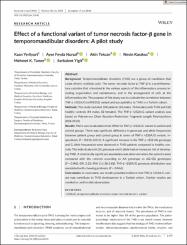| dc.contributor.author | Yerliyurt, Kaan | |
| dc.contributor.author | Nursal, Ayse Feyda | |
| dc.contributor.author | Tekcan, Akin | |
| dc.contributor.author | Karakus, Nevin | |
| dc.contributor.author | Tumer, Mehmet K. | |
| dc.contributor.author | Yigit, Serbulent | |
| dc.date.accessioned | 2019-11-26T20:14:25Z | |
| dc.date.available | 2019-11-26T20:14:25Z | |
| dc.date.issued | 2019 | |
| dc.identifier.issn | 0887-8013 | |
| dc.identifier.issn | 1098-2825 | |
| dc.identifier.uri | https://dx.doi.org/10.1002/jcla.22641 | |
| dc.identifier.uri | https://hdl.handle.net/20.500.12513/3923 | |
| dc.description | WOS: 000456672300022 | en_US |
| dc.description | PubMed ID: 30129153 | en_US |
| dc.description.abstract | Background Temporomandibular disorders (TMD) are a group of conditions that cause chronic orofacial pain. The tumor necrosis factor beta (TNF-beta) is a proinflammatory cytokine that is involved in the various aspects of the inflammatory process including organization and maintenance, and in the arrangement of cells at the inflammation site. The purpose of this study was to evaluate the correlation between TNF-beta +252A/G (rs909253) variant and susceptibility to TMD in a Turkish cohort. Methods The study included 104 patients (26 males, 78 females) with TMD and 126 healthy controls (44 males, 82 females). The TNF-beta +252A/G variant analysis was based on Polymerase Chain Reaction-Restriction Fragment Length Polymorphism (PCR-RFLP). Results There was no deviation from HWA for TNF-beta +252A/G variant in patient and control groups. There was significant difference in genotype and allele frequencies between patient group and control group in terms of TNF-beta +252A/G variant, respectively (P = 0.010, 0.015). A significant increase in the TNF-beta +252 AG genotype and G allele frequencies were observed in TMD patients compared to healthy controls. The individuals with GG genotype and G allele had an increased risk of developing TMD. A statistically significant association was observed when the patients were compared with the controls according to AA genotype vs AG+GG genotypes (P = 0.002, OR: 2.23, 95% CI:1.31-3.82). TNF-beta +252A/G genotype distribution was associated with chewing problems (P = 0.046). Conclusions In conclusion, our results provided evidence that TNF-beta +252A/G variant may contribute to TMD development in a Turkish cohort. Further studies are needed to confirm this observation. | en_US |
| dc.language.iso | eng | en_US |
| dc.publisher | WILEY | en_US |
| dc.relation.isversionof | 10.1002/jcla.22641 | en_US |
| dc.rights | info:eu-repo/semantics/openAccess | en_US |
| dc.subject | +252A/G | en_US |
| dc.subject | temporomandibular disorders | en_US |
| dc.subject | tumor necrosis factor beta | en_US |
| dc.subject | variant | en_US |
| dc.title | Effect of a functional variant of tumor necrosis factor-beta gene in temporomandibular disorders: A pilot study | en_US |
| dc.type | article | en_US |
| dc.relation.journal | JOURNAL OF CLINICAL LABORATORY ANALYSIS | en_US |
| dc.contributor.department | Kırşehir Ahi Evran Üniversitesi, Tıp Fakültesi, Temel Tıp Bilimleri, Tıbbi Biyoloji ABD | en_US |
| dc.identifier.volume | 33 | en_US |
| dc.identifier.issue | 1 | en_US |
| dc.relation.publicationcategory | Makale - Uluslararası Hakemli Dergi - Kurum Öğretim Elemanı | en_US |


















